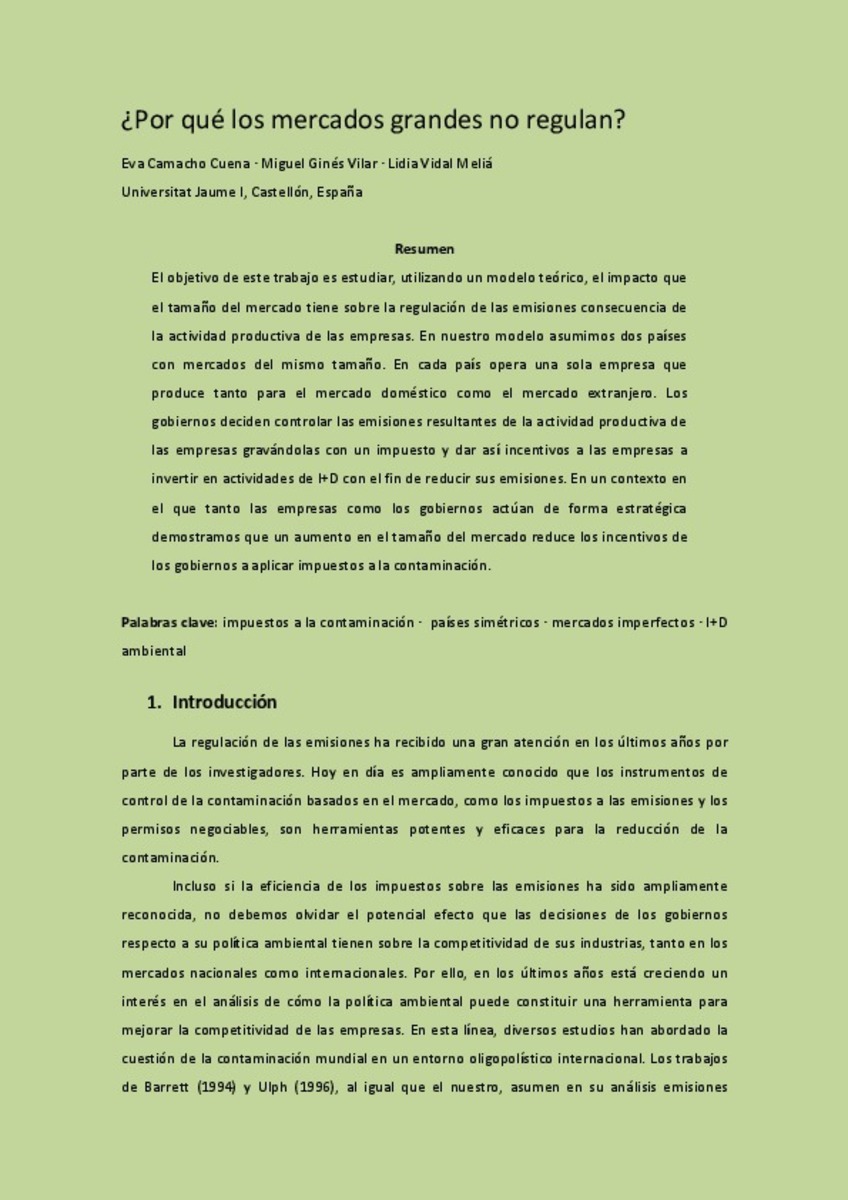Mostrar el registro sencillo del ítem
¿Por qué los mercados grandes no regulan?
| dc.contributor.author | Camacho Cuena, Eva | |
| dc.contributor.author | Ginés-Vilar, Miguel | |
| dc.contributor.author | Vidal-Meliá, Lidia | |
| dc.date.accessioned | 2017-02-01T19:50:28Z | |
| dc.date.available | 2017-02-01T19:50:28Z | |
| dc.date.issued | 2016 | |
| dc.identifier.citation | CUENA, Eva Camacho; VILAR, Miguel Ginés; MELIÁ, Lidia Vidal. ¿ Por qué los mercados grandes no regulan?. Revista de treball, economia i societat, 2016, no 82, p. 1-9. | ca_CA |
| dc.identifier.issn | 1137-0874 | |
| dc.identifier.uri | http://hdl.handle.net/10234/165800 | |
| dc.description.abstract | El objetivo de este trabajo es estudiar, utilizando un modelo teórico, el impacto que el tamaño del mercado tiene sobre la regulación de las emisiones consecuencia de la actividad productiva de las empresas. En nuestro modelo asumimos dos países con mercados del mismo tamaño. En cada país opera una sola empresa que produce tanto para el mercado doméstico como el mercado extranjero. Los gobiernos deciden controlar las emisiones resultantes de la actividad productiva de las empresas gravándolas con un impuesto y dar así incentivos a las empresas a invertir en actividades de I+D con el fin de reducir sus emisiones. En un contexto en el que tanto las empresas como los gobiernos actúan de forma estratégica demostramos que un aumento en el tamaño del mercado reduce los incentivos de los gobiernos a aplicar impuestos a la contaminación. | ca_CA |
| dc.description.abstract | This paper aims to analyse, through the application of a theoretical model, the impact that the size of markets has on the regulations over the resulting emissions of the production activity of companies. In our model we acknowledge two countries with similar size markets. In each country there is just one operating company, producing both for the domestic and the foreign market. The governments decide to control the abovementioned emissions by introducing a tax, while, at the same time, incentives are given to those companies in order for them to invest in R&D and thus reduce their emissions. In a context where both the companies and the governments assume strategic roles we prove that an increase in the size of the market reduces the incentives governments grant regarding the introduction of taxes against pollution. | |
| dc.format.extent | 9 p. | ca_CA |
| dc.format.mimetype | application/pdf | ca_CA |
| dc.language.iso | spa | ca_CA |
| dc.publisher | Generalitat Valenciana: Comité economic i social de la Comunitat Valenciana | ca_CA |
| dc.relation.isPartOf | Revista de treball, economia i societat, 2016, núm. 82 | ca_CA |
| dc.rights.uri | http://rightsstatements.org/vocab/CNE/1.0/ | * |
| dc.subject | Impuestos a la contaminación | ca_CA |
| dc.subject | Países simétricos | ca_CA |
| dc.subject | Mercados imperfectos | ca_CA |
| dc.subject | I+D ambiental | ca_CA |
| dc.subject | Pollution taxes | |
| dc.subject | Symmetrical countries | |
| dc.subject | Imperfect Markets | |
| dc.subject | Environmental R & D | |
| dc.title | ¿Por qué los mercados grandes no regulan? | ca_CA |
| dc.type | info:eu-repo/semantics/article | ca_CA |
| dc.rights.accessRights | info:eu-repo/semantics/openAccess | ca_CA |
| dc.relation.publisherVersion | http://www.ces.gva.es/cs_/htm_trabajos/trabajos_articulos.htm | ca_CA |
| dc.type.version | info:eu-repo/semantics/publishedVersion |
Ficheros en el ítem
Este ítem aparece en la(s) siguiente(s) colección(ones)
-
ECO_Articles [693]







